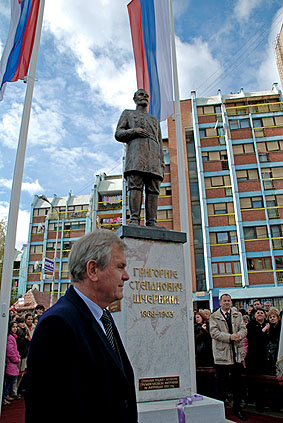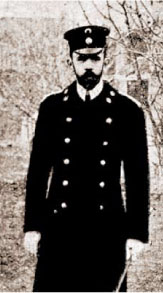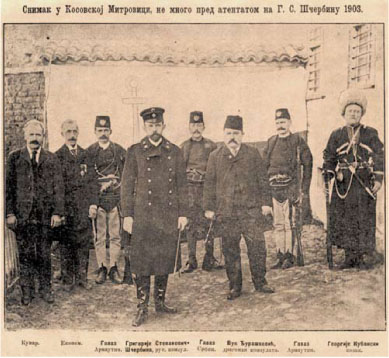Friends
GRIGORI STEPANOVICH SHCHERBIN (1868-193), RUSSIAN CONSUL IN KOSOVSKA MITROVICA
A Victim of Noble Sentiments
He entered the diplomatic service of Imperial Russia when he was only 23, and was one of its most promising people. He spoke Turkish, Arabic, Albanian, Armenian, Bulgarian and Serbian extraordinarily well. After gaining diplomatic experience in Constantinople, Skopje, Cetinje and Skadar, in 1902 he was appointed Consul in Mitrovica. His purpose and the purpose of the newly established Consulate: to prevent pogroms and save the Serbian population from the Albanian tyranny. He was welcomed as a savior, which he did turn out to be. What he had come for, he did ”too well”. He died of wounds inflicted by an Albanian traitorous attack, from the back, and that ”drop of Russian blood in the sea of Serbian blood in Kosovo” is, as we can see, still alive
By: Mišo Vujović
The situation in Kosovo and Metohija in the late XIX and early XX century was almost identical as it is today, one hundred years later in the era of multiethnicity, hidden behind humanism and democracy, in which foundations lies masked the right of the more powerful one to force and violence. The Serbian people in Kosmet have been suffering different forms of terror for centuries: from the Turkish vengeances to the Albanian tyranny, getting more severe as time was passing by, and culminating in the late XIX century. With the weakening of the Ottoman Empire at the beginning of the previous century, the Albanians saw an opportunity to unite their scattered and confronted ethnic tribes into one Albanian state in the Balkans. Some powerful states, such as Austro-Hungary, watched the forced changing of the ethnic structure and prosecution of the Christian population in the area of Old Serbia with sympathy.
Vladimir Ćorović writes:
 ”The proportion of the forces in the Balkans, especially the influence of Austro-Hungary in Serbia and the wide influence of the Viennese diplomacy intelligence services among the Albanians, tied the hands of the Serbian diplomacy in attempts to protect their fellow countrymen in Old Serbia more efficiently. After the death of king Milan, the most reliable friend of Vienna in Belgrade, king Aleksandar attempted to change the foreign affairs orientation and to more strongly rely on Russia, in order to distract the attention of the Serbian public, which was unsatisfied with his marriage to Draga Mašin.” ”The proportion of the forces in the Balkans, especially the influence of Austro-Hungary in Serbia and the wide influence of the Viennese diplomacy intelligence services among the Albanians, tied the hands of the Serbian diplomacy in attempts to protect their fellow countrymen in Old Serbia more efficiently. After the death of king Milan, the most reliable friend of Vienna in Belgrade, king Aleksandar attempted to change the foreign affairs orientation and to more strongly rely on Russia, in order to distract the attention of the Serbian public, which was unsatisfied with his marriage to Draga Mašin.”
After the ”Kolašin Affair”, the tension between Serbia and Austro-Hungary grew into an open conflict. The respectable historian and diplomat Dušan Bataković, writing about the death of the Russian Consul Grigori Stepanovich Shcherbina, states:
”At the turn of the XIX and XX centuries, the position of the Serbian population in Old Serbia deteriorated abruptly. After the Greek-Turkish war in 1897, numerous Albanian volunteers in the Turkish army were fanatized with Pan-Islamic agitation. They came back to their homes armed, unsatisfied with the outcome of the war and, fearing for their privileges, they turned their weapons against the unprotected and unarmed Serbian population.”
The abbot of the Imperial Lavra of Visoki Dečani, Hadži Serafim Ristić, wrote about the sufferings of the Kosmet Serbs in ”The Weeping of Old Serbia”.
The Albanian tyranny over the Serbian people is given in the letter to the Turkish Sultan Abdul-Asis:
”If the Albanian tyrants are not stopped, we shall be forced to move from the land drenched with the blood of our ancestors, and from our hearths… Peć and the Nahia of Peć constantly moan under the Albanian whip… It would take years to name all the evils and injustices made only in this Nahia, to write them down and give them to Your Majesty on a paper. We will mention only a few as to make basis for charges, so Your Majesty would at least be informed about them, if not to examine them in detail.”
UNDERSTANDING THE BLACK CALDRON Father Serafim, Archimandrite of Dečani, lists the Albanian crimes in the letter to the Turkish Sultan. Hundreds of examples of robberies, abductions of girls, rapes, confiscated property, murders… He mentions that letters had been sent earlier to the Constantinople Porta, but that there was no reply. The crimes are multiplying, concludes father Serafim, stating that he will submit the proofs of the crimes to the delegations of the European powers.
At the beginning of the previous century, the famous Jovan Dučić, Branislav Nušić, Milan Rakić, Vladimir Ćorović, all sent disturbing reports from Kosmet. Just like today, everyone was looking towards the powerful protector of small Slavic nations – Russia, which, in order to put pressure on the Porta, besides the Consulates in Skopje and Prizren, opened a Consulate in Mitrovica on May 7, 1902.
 Grigori Stepanovich Shcherbina was appointed Consul in Mitrovica. He was one of the most promising young Russian diplomats, an expert in the boiling Balkan issues. Although he had just stepped into the fourth decade of his life, born in 1868, he already had enviable diplomatic experience behind him: Constantinople, Skopje, Cetinje, Skadar. Grigori Stepanovich Shcherbina was appointed Consul in Mitrovica. He was one of the most promising young Russian diplomats, an expert in the boiling Balkan issues. Although he had just stepped into the fourth decade of his life, born in 1868, he already had enviable diplomatic experience behind him: Constantinople, Skopje, Cetinje, Skadar.
After finishing gymnasium in his birthplace of Chernigov, Grigori Stepanovich Shcherbina enrolled at Lazar’s Academy for oriental languages. As one of the best graduates, he was employed at the Ministry of Foreign Affairs of Imperial Russia. He spoke Turkish, Arabic, Albanian, Armenian, Bulgarian and Serbian extraordinarily well, which recommended him for diplomatic service in the Russian delegation in Constantinople, where he took over his duty in 1891, at the age of only 23.
From the first moment of his employment in Constantinople, Grigori Stepanovich Shcherbina attempted to unriddle the mysteries of the black caldron of the Balkans, assiduously studying the culture and history of the Balkan nations. He was interested in the situation in the enslaved Slavic countries, especially in Old Serbia (Kosmet and Macedonia). Two years later (1893), Shcherbina was appointed secretary of the Russian Consulate in Skopje, from where he was transferred to Cetinje. In 1896, he was appointed vice-Consul of Russia in Skadar, from where he sent detailed reports to the Ministry in St. Petersburg about the Albanians, whose national expansion was in full swing, as it is today.
GREETED AS A SAVIOR Isa Boletini, robber and bandit, gave a ”besa” (oath) that he will set on fire any house rented to the Russian Consul. The threats of the Albanian extremists gave results. At the end of August 1902, Isa Boletini organized demonstrations in Mitrovica. Before the unbridled and armed masses, Shcherbina’s advance guard and personal suite, with all their things, saving their lives, ran from Mitrovica and found shelter with the Russian Consul Mashkov in Skopje. Serbian diplomacy used this incident to make additional pressure on the Porta, requesting disarming of the Albanians or arming of the Serbs. Besides Russian support, Serbia was also supported by France, which forced the Porta to send the infamous Hilmi-Pasha to perform ”cosmetic reforms”. General Sava Grujić, in his letter to official Belgrade, writes:
”The Serbian people in Kosmet await the arrival of Shcherbina like the frostbitten one awaits the sun.”
Fearing for Shcherbina’s safety, official St. Petersburg delays his arrival to Mitrovica and requests banishing the main leader of the anti-Russian demonstrations Isa Boletini from Kosmet. Isa Boletini, as written by Milan Nikolić, teacher from Mitrovica, was ”solemnly, with his arms, seen off to Constantinople, which opened the path to the arrival of Grigori Stepanovich Shcherbina to Mitrovica.”
The Russian Consulate in Mitrovica was officially opened on May 7, 1902, and Shcherbina arrived on January 26, 1903. A magnificent welcome was made for him at the train station in Kosovska Mitrovica. The young Consul was also welcomed by Branislav Nušić.
Although warned by the Turkish authorities, the Albanian leaders did not hide their open hostility towards the Russian Consul. Direct threats were sent from the gatherings, the so-called Albanian meetings. For the Serbs, the arrival of the Russian Consul meant at least some protection. Enthusiasm was mixed with fear from the Albanian revenge.
The Consul’s presence led to the reviving of cultural life in Mitrovica. For the first time, the school saint day was celebrated in the Mitrovica elementary school, on the day of the first Serbian saint and educator St. Sava. Grigori Stepanovich Shcherbina, a young diplomat who proudly wore his Cossack uniform, had a place of honor in that celebration.
TRAITOROUS ATTACK, IN THE BACK  At the same time, the up to then conflicted Albanian tribal leaders, give a ”besa” by Murat’s tomb, that they shall attack Vučitrn and Mitrovica in order to prevent the reforms. The Russian Consul Shcherbina was proclaimed most responsible for the reforms of Constantinople and for banishing Isa Boletini. Shcherbina, through the Russian Consul Moshkov, requests the Porta to prevent the Albanians from attacking Vučitrn. At the same time, the up to then conflicted Albanian tribal leaders, give a ”besa” by Murat’s tomb, that they shall attack Vučitrn and Mitrovica in order to prevent the reforms. The Russian Consul Shcherbina was proclaimed most responsible for the reforms of Constantinople and for banishing Isa Boletini. Shcherbina, through the Russian Consul Moshkov, requests the Porta to prevent the Albanians from attacking Vučitrn.
However, on March 29, the Albanians attack and easily enter the town of Vojinović. As Branislav Nušić was told by one of the disarmed guards, ”the Albanians first robbed the Church of St. Elijah, dispelled the funeral procession, turned over the coffin with the deceased, and continued raging and looting Vučitrn”. Shcherbina informs Moshkov that the Albanians are preparing an attack on Mitrovica. The Mitrovica Serbs, afraid that the Turkish army would not defend the town, ask Shcherbina for weapons and protection. Upon Shcherbina’s insistence, Hilmi-Pasha places one infantry regiment in Bair towards Svinjari, in order to prevent the attack on Mitrovica. The Porta sends sixteen battalions from Thessalonica as support.
According to Vladimir Ćorović, the attack on Mitrovica began on March 30, 1903, and Saidbei, the commander of the Mitrovica defense, had to shoot several nisams (Albanian soldiers) who did not want to do battle against their rioting fellow-countrymen. The Turks had 300 armed soldiers against 2.000 rebels, but the attackers were forced to retreat after the first cannonade.
All the time, the Russian Consul, in a Cossack uniform, patrolled the front line of defense on his horse, encouraging the defenders not to yield. In his report to his government, Shcherbina writes that ”Albanian losses cannot be determined exactly, because they took away their dead and wounded. 63 corpses were left on the battlefield, all of them immediately buried.”
Expecting a new attack, Grigori Stepanovich Shcherbina continued patrolling the posts with several Turkish officers and policemen. At the train station, by the ammunition depot, Ibrahim Halit, a powder magazine guard, attempted to kill the Consul from the back with two bullets. One bullet wounded Shcherbina in the shoulder, and the other hit the escorting soldier. Although wounded, the Consul promised mercy to Ibrahim Halit if he confessed the true motifs of the attack. The assassinator defended himself claiming that it is a personal revenge, because his brother died in the fights which took place the previous day.
”Večernje novosti” reports that the Serbian nation took the news about the wounding of the Russian Consul with dismay. The Serbian government sends the famous surgeon Dr. Subotić to Mitrovica. The Sultan’s doctor Calibrov arrives from Skopje, and, unlike Dr. Subotić, gives optimistic forecasts.
”Večernje novosti” reports that the whole Porta was up on its feet because of this event. Ferid-Pasha, in behalf of the Sultan, offered the Russian emissary in Constantinople a great apology, and most energetically convinced him that the Porta is ready ”to punish those who committed the crime, and to completely take care of the situation in the Kosovo vilayet, which is an explicit order of the Sultan.”
FAREWELL JOURNEY Vladimir Ćorović writes that seriously wounded Shcherbina never submitted to discouragement. He often made jokes about himself, saying also ”that he is going to the Lord as a victim of our national cause, and that the Serbs should enlist him as a saint if he dies from the Albanian hand”. From his bed, through the Serbian Consul in Skopje Kurtović, he sent gratitude to King Aleksandar and the Kingdom of Serbia Government for their attention and care. Numerous famous people encouraged and emboldened him to recover, while the best Turkish, Serbian and Russian doctors were always at his side.
However, on April 10, at 1:15 a.m., at the age of only 35, the Consul of Imperial Russia Grigori Stepanovich Shcherbina passed away. Almost all of the European newspapers published the news about the death of the brave Russian diplomat on their front pages:
”…He fell in the battle for the honorable cross, he parted with his suffering soul after several days of torments, he died for the holy Orthodoxy and freedom of the Serbian people. The son of powerful Russia laid his head in Kosovo, protecting and defending the non-liberated brothers, in the name of his Emperor and in the name of his homeland’s power. With his death, he proved the love and care of his master for our non-liberated brothers, with his death he more closely tied the two same-blooded nations, the Serbs and the Russians. (…)” (”Večernje novosti”, no. 87)
Toholka, the Russian vice-Consul in Prizren, according to Dušan Bataković, said that Shcherbina was happy for being given the opportunity to die for his brothers.
”Along the whole railroad from Mitrovica to Skopje, center of the Kosovo vilayet, numerous Kosovo Serbs welcomed the train with his coffin on the stations in Vučitrn, Priština, Ferizović (Uroševac). The Serbian leaders and students came into the train and held memorial services over Shcherbina’s coffin. The number of Serbs who wanted to enter the train and honor Shcherbina in Ferizović was so big, that the Turkish commander forbade them to enter the wagon, considering it a ceremonial phenomenon with a political background. In Skopje, his body was welcomed by 24 Serbian priests. Hieromonk Arsenije from the Mount Athos Cell of St. John Chrysostom watched over his catafalque. G. S. Shcherbina was buried in his birthplace, in Chernigov, on April 26, 1903”, writes Bataković.
In Belgrade and throughout Serbia, memorial services where held to a great friend and protector, whose death was soon pushed into oblivion in political circles, covered with new bloody events in the Balkans. Another Consul, the chronicle-writer of the Kosmet drama Vladimir Ćorović, wrote, and the grateful Serbs, saving from oblivion the memory of a great friend, engraved on the monument to Shcherbina, unveiled on the day of St. Demetrius in the year of our Lord 2007:
”A drop of brotherly Russian blood dripped into streams of Serbian blood, which have been flowing through Kosovo for centuries.”
***
Warning
”And there will probably be more bloody wars for that distinguished piece of land. Since, the one who will have Kosovo, will be the master of the Balkan Peninsula.”
(Vjekoslav Klaić, ”Images from the Slavic History”, 1903)
***
Sorrowful Luck
Even before being appointed Russian Consul in Mitrovica, Shcherbina openly spoke about the tyranny over the ”Serbian people”, promising that he will use all available means to protect the Serbian population. From the first moment, with his righteous boldness, the talented diplomat ignored warnings of the danger of the Albanian revenge. Once he said to Branislav Nušić, Serbian Consul and famous writer:
”You, Serbs, are not that lucky see me dead. My death would bring you freedom.”
*** Drop
Another Consul, the chronicle-writer of the Kosmet drama, Vladimir Ćorović, wrote about the assassination of Shcherbina and the tragic outcome: ”A drop of brotherly Russian blood dripped into streams of Serbian blood, which have been flowing through Kosovo for centuries.” Saving the memory of the great friend from oblivion, the grateful Serbs engraved these words on the monument to Shcherbina, unveiled on the day of St. Demetrius, in the year of our Lord 2007 |
